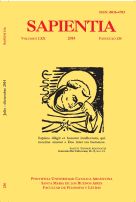Nominalismo o moral y sus implicancias en la praxis política
Keywords:
Moral Nominalism, Freedom of indifference, Ockham, Aquinas, Natural InclinationsAbstract
Nominalism, emerged within the Catholic Church, represented a complete break with the Thomistic tradition. In moral terms, the core of this nominalist revolution is given by a new conception of freedom, and the place that it will hold in all human powers. Being the very essence of the soul with its intrinsic order of powers and operating habits that breaks from it. Freedom will stand as a sort of all, taking the place of principal and maximum power in the ontological structure of the human soul. As a corollary of this situation nominalism reject moral teaching of Thomistic natural inclinations, natural law, necessary trend voluntas ut natura happiness, and the Thomist theory of habits and virtues as natural, permanent and free provisions of the power to act.Downloads
Download data is not yet available.
Downloads
Published
05/02/2019
How to Cite
Vogliazzo, M. L. (2019). Nominalismo o moral y sus implicancias en la praxis política. Sapientia, 70(236), 131–142. Retrieved from https://erevistas.uca.edu.ar./index.php/SAP/article/view/1836
Issue
Section
Notas y Comentarios
License





 Sapientia
Sapientia